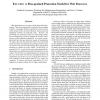Free Online Productivity Tools
i2Speak
i2Symbol
i2OCR
iTex2Img
iWeb2Print
iWeb2Shot
i2Type
iPdf2Split
iPdf2Merge
i2Bopomofo
i2Arabic
i2Style
i2Image
i2PDF
iLatex2Rtf
Sci2ools
ICDCS
2010
IEEE
2010
IEEE
ESCUDO: A Fine-Grained Protection Model for Web Browsers
Web applications are no longer simple hyperlinked documents. They have progressively evolved to become highly complex—web pages combine content from several sources (with varying levels of trustworthiness), and incorporate significant portions of client-side code. However, the prevailing web protection model, the same-origin policy, has not adequately evolved to manage the security consequences of this additional complexity. As a result, web applications have become attractive targets of exploitation. We argue that this disconnection between the protection needs of modern web applications and the protection models used by web browsers that manage those applications amounts to a failure of access control. In this paper, we present ESCUDO, a new web browser protection model designed based on established principles of mandatory access control. We describe our implementation of a prototype of ESCUDO in the Lobo web browser, and illustrate how web applications can use ESCUDO for securin...
Distributed And Parallel Computing | ICDCS 2010 | Protection Model | Web Applications | Web Browser |
| Added | 15 Aug 2010 |
| Updated | 15 Aug 2010 |
| Type | Conference |
| Year | 2010 |
| Where | ICDCS |
| Authors | Karthick Jayaraman, Wenliang Du, Balamurugan Rajagopalan, Steve J. Chapin |
Comments (0)

